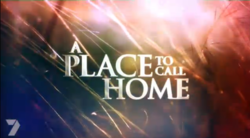A Place to Call Home (TV series)
| A Place to Call Home | |
|---|---|
 |
|
| Genre | Period drama |
| Created by | Bevan Lee |
| Starring | |
| Composer(s) | Michael Yezerski |
| Country of origin | Australia |
| Original language(s) | English |
| No. of seasons | 4 |
| No. of episodes | 45 (list of episodes) |
| Production | |
| Executive producer(s) |
|
| Producer(s) | Chris Martin-Jones |
| Location(s) | Camelot (renamed as Ash Park) (34° 2'15.09"S 150°42'22.30"E) Camden and Southern Highlands (Inverness) |
| Cinematography | John Stokes |
| Running time | 42–45 minutes |
| Production company(s) | Seven Productions |
| Distributor | Endemol |
| Release | |
| Original network |
Seven Network (2013–14) SoHo (2015) Showcase (2016–) |
| Picture format | 576i (SDTV) |
| Audio format | Stereo |
| Original release | 28 April 2013 – present |
| External links | |
| Website | |
A Place to Call Home is an Australian television drama series that debuted on the Seven Network on Sunday 28 April 2013. Set in rural New South Wales in the period following the Second World War, it follows Sarah Adams (Marta Dusseldorp), who has returned to Australia after twenty years abroad to start a new life and ends up clashing with wealthy matriarch Elizabeth Bligh (Noni Hazlehurst). The main cast also consists of Brett Climo (George Bligh), Craig Hall (Dr. Jack Duncan), David Berry (James Bligh), Abby Earl (Anna Poletti), Arianwen Parkes-Lockwood (Olivia Bligh), Aldo Mignone (Gino Poletti), Sara Wiseman (Carolyn Bligh), Jenni Baird as (Regina Bligh) and Frankie J. Holden (Roy Briggs).
It was created by Bevan Lee and has been described as a "compelling melodrama about love and loss set against the social change of the 1950s".
The series was threatened with cancellation at the end of its second season, but as of February 2017[update], four seasons have been aired and a fifth season is in production. The series has gained loyal followings in international distribution as well as in its home country.
Development for A Place to Call Home began after Bevan Lee completed his "domestic trilogy" (Always Greener, Packed to the Rafters and Winners & Losers). He took inspiration from film director Douglas Sirk's 1950s films such as Written on the Wind (1956) and All That Heaven Allows (1955). Lee told The Age that he wanted to create a romance-driven melodrama based in the 1950s because people's lives in the present are "relatively bland". He said: "At the end of the day, conflict is drama and we live in relatively conflict-free society. I had to go to a place where there was pain and damage and hurt; after the war there was." The script is co-written by Lee and Trent Atkinson.
...
Wikipedia
